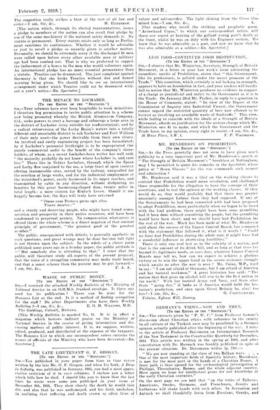MR. HENDERSON ON PROHIBITION.
[To THE EDITOR OP THE " SPECTATOR."] SIR,—As the Press generally does not seem to have given much publicity to a very important part of Mr. Henderson's speech at " The Strength of Britain Movement's " breakfast at Nottingham, may I be permitted to quote his remarks in the Spectator, whose policy of " Down Glasses " for the war commands 'such respect and admiration ?
Mr. Henderson said it was a libel on the working classes t4 contend that Prohibition would mean revolution, and challenged those responsible for the allegation to have the courage of their assertions, and to test the opinion of the working classes. If they would do so, they would probably find that there was greater unanimity amongst Labour than they had supposed. If any of the Governments he had been connected with had been prepared to adopt Prohibition, more particularly when we began to be faced with the food problem, there might have been some grumbling had it been done without consulting the people, but the grumbling would•liave been short, and we should have had Prohibition for the rest of the war. Much has been made of what Mr. Henderson said about the success of the Liquor Control Board, but compared with the statement that followed it, what is it worth ? "Could we have lied Prohibition during the whole war, it might hare had a wonderful influence in shortening hostilities."
There is only one real test as to the sobriety of a nation, and that is the amount of its drink bill, and as long as that rises far beyond its legitimate needs, as ours does, whatever Liquor Control Boards may tell us, how can we expect to achieve a glorious victory or to win the upper hand in the severe economic struggle which awaits us after the war is over ? Mr. Caine, M.P., used to say : I ant not afraid of Germany, but I am afraid of America and her teetotal workmen." A great historian has said: "The nation that first gives up alcohol will rise to be the first nation in the world." With her teetotal Army and Navy, and State after State "going dry," it looks as if America would fulfil the his- torian's prediction, and once again Great Britain be, alas! toe
late!—I am, Sir, &c., G. CASTLESTE WART. Falaise, Eghain Hill, Surrey.


































 Previous page
Previous page